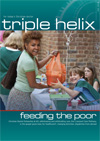'There are more things in heaven and earth, Horatio, than are dreamt of in your philosophy.' Hamlet Act 1, Scene 5
Our age idolises the gods of economics, technology and science. Debates and decisions within the health service, as in society at large, tend to revolve around them. In a time of economic austerity the arts and the humanities tend to be overlooked in favour of science and technology. After all, they are seen as the drivers of the economy.
Should Christians be content with such a limited view of reality? Christians often share with society at large a diminished view of the arts and humanities. Rather than seriously engaging with them, they are more likely to relegate them to be mere light entertainment.
This is all background to a discussion of the role of the arts in 'holistic' medicine. There is a pietistic strand in British Christianity which sees our faith as being principally about our personal and individual lives. So faith has less and less to do with culture 'out there'. But true holistic health is not merely a combination of physical health and spiritual concerns. It is when every aspect of our existence is submitted to the lordship of Christ.
Consider what CS Lewis writes about our natures:
'They (people) propound mathematical theorems in beleaguered cities, conduct metaphysical arguments in condemned cells, make jokes on scaffolds, discuss the last new poem while advancing to the walls of Quebec, and comb their hair at Thermopylae. This is not panache: it is our nature.' (1)
And consider this from the Christian thinker Calvin Seerveld:
'I know that the Lord shall save some without a cultural deed to their name, as if by fire...but...Creaturely life is what the Lord wants redeemed... bearing fruit in obedience in all facets of our existence...I am talking about sanctification that is gritty and concrete.' (2)
Seerveld believes aesthetic health is as vital to our well-being as physical health. Of course we should check what the Bible has to say about this. It is striking, for instance, when considering the humanities and literature, to observe that the Bible contains many if not most forms of literature, with the notable exception of scientific discourse.
The Old Testament scholar John Walton notes that people in the Ancient Near East didn't have a 'material ontology' like we do, but a 'functional ontology'. (3) They were less interested in what things were made of, than what things were for. Our world has different priorities. We are influenced by Enlightenment rationalism. So when we read poetry in the Psalms we are prone to try to abstract some systematic theology, or a doctrinal statement, rather than let the words and idioms wash over us. Poetry reaches our emotions through our imaginations, not analytic logic. The Bible reflects imaginative and intuitive ways of thinking as much as analysis.
Indeed, when we think thoughts we find it difficult to conceive of anything other than words and language. We so favour words with definitions, and sentences with precise meanings, that we fail to see that this is only one way that the world is represented to us. But this is by no means the main way. Can you think about a melody, or an image?
As clinicians presented with the problems of life we can feel hopeless and helpless if we can't give answers. But what if we thought differently? When there is not practical help that we can offer, maybe we need to find ways to help people comprehend their experiences in a way that is both real and profound using the arts and humanities.
Albinoni's Adagio in G Minor expresses to me a sorrow that I often repress in day-to-day life but which I know is there. How do I make sense of my sin and the relationships I have harmed? How do I feel about starving children who I do not help? What should the human race feel about the environmental crisis? Maybe listening to music can help us face these realities rather than hiding them beneath a cacophony of chaotic daily chores. What about a sense of joy or longing that can't be satisfied by material pleasures? Can poetry help us to transcend our momentary troubles? Can a Rembrandt self-portrait or a Dostoevsky novel reveal something of the troubles of our own hearts? Can the playfulness of a rhyme or poem, or a piece of chocolate, lift us out of drudgery and help us enjoy spending time with our children? How do we evaluate whether or not someone should start taking a statin? Is it a pure statistical consideration of risks and benefits, or do we as a society need to reconsider what things in life are important? Can the humanities help us to do that?
There is no correct answer to how the arts and humanities might help us be better doctors but if we hope to be holistic, to bring all of life under Christ's lordship, then we would be negligent if we fail to use them in the service of our patients.
James May is a SHO from east London.
































